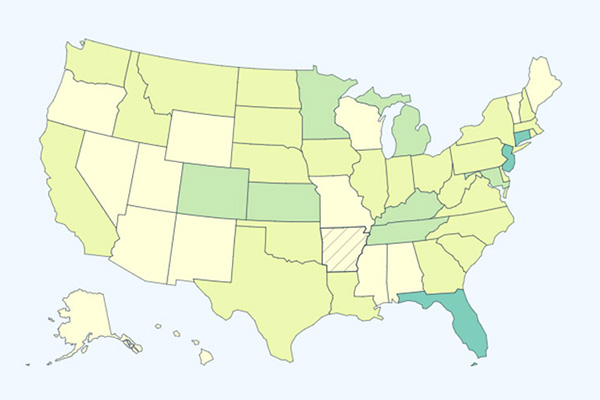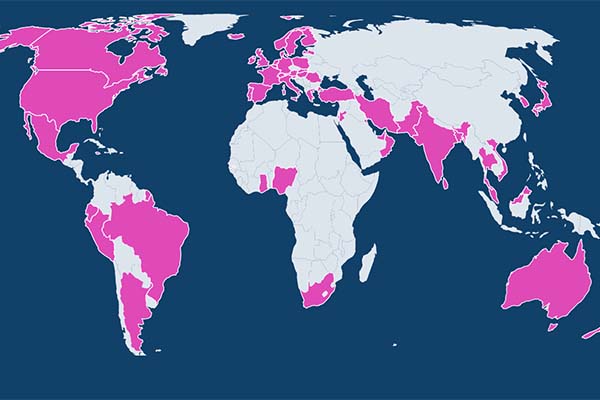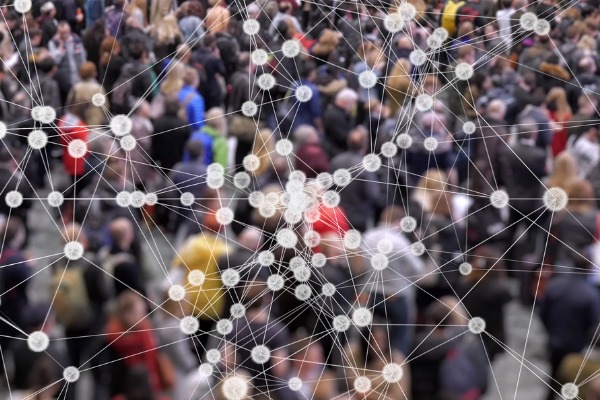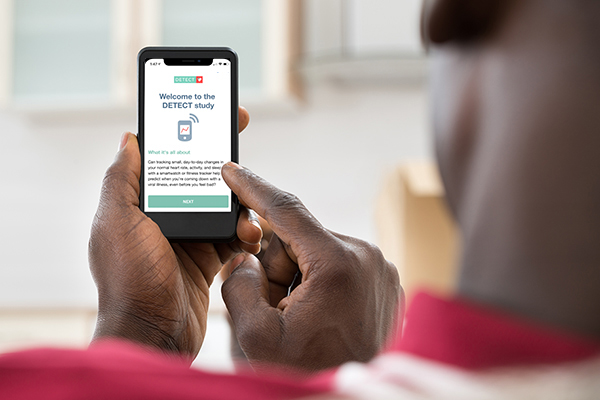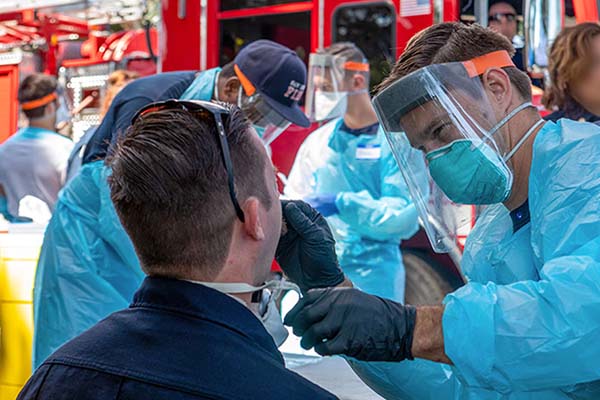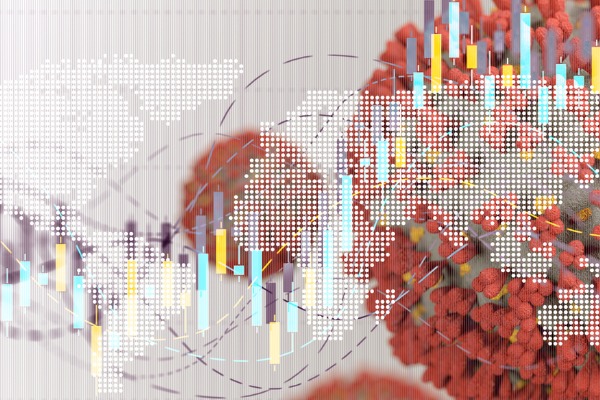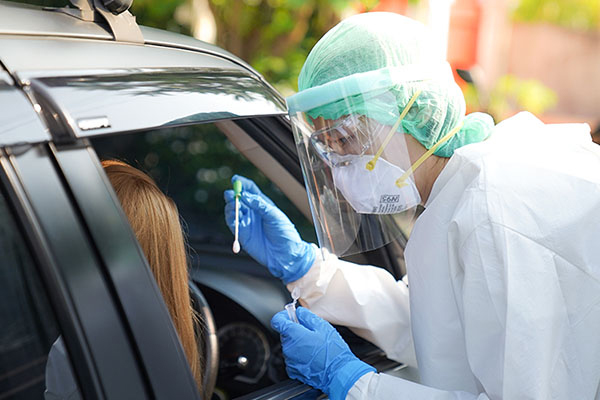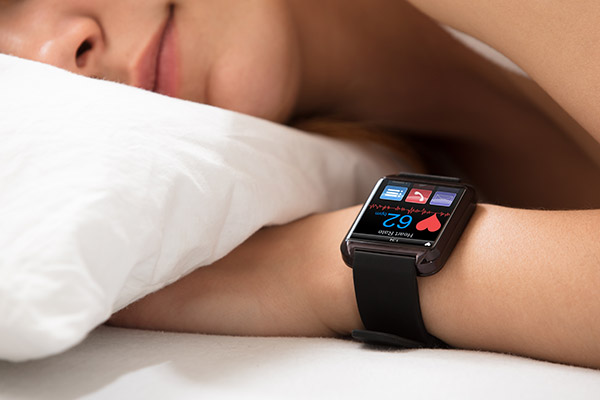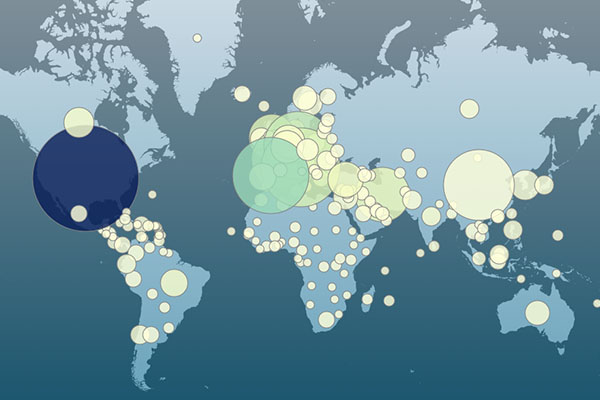Early detection is critical for effective public health response to infectious disease outbreaks
Being able to quickly identify, trace and isolate those infected with a viral illness such as COVID-19 is the best way to stop an outbreak. Yet conventional tools only take us so far—and that’s not far enough.
Scripps Research is leveraging the enormous power of digital health data to create a better solution. In a nationwide study of participants who wear a smartwatch or fitness tracker device, our scientists found it’s possible to predict with a high level of accuracy who has COVID-19 based on changes in sleep, activity and resting heart rate.
The team is using this data to build a predictive model they hope will ultimately enable disease detection before symptoms arise. This would be a major advance, as some people may be more contagious during this early period of infection.
The DETECT study is still accepting new participants. If you use a smartwatch or activity tracker such as a Fitbit, Apple Watch, Amazfit or Garmin Watch, you can join the study and consent to share your data by downloading the MyDataHelps mobile app.
B.1.1.7 variant of COVID-19 virus spreading rapidly in United States
A genetic analysis of virus samples suggests that the UK-originating variant, which is 40-50 percent more transmissible, entered the country in late November 2020. Read more
Experts call for streamlined lab tests of SARS-CoV-2 variants to spot worrisome features
Rapid genetic sequencing of COVID-19 virus samples isn’t enough; standardized lab assessments are needed to understand potential mutations that may boost infectiousness or enable immune evasion. Read more
Scripps Research tracks prevalence of new COVID-19 variants with daily reports on Outbreak.info
Filling the demand for accessible and comprehensive data on coronavirus mutations, scientists create online reports available to researchers and members of the public. Read more
Scientists and public health officials use genomics to understand how COVID-19 spreads in San Diego, neighboring regions
With funding from the Centers for Disease Control and Prevention, scientists at Scripps Research and UC San Diego are sequencing the virus to help guide local outbreak response. Read more
Early results from DETECT study suggest fitness trackers and smartwatches can predict COVID-19 infection
Sensor data from wearable devices can complement virus testing and conventional screening to signal new infections. Read more
Scientists partner with San Diego transit and health workers to study wearable devices for detecting COVID-19
Scripps Research is collaborating with frontline workers at the San Diego Metropolitan Transit System and Scripps Health to help detect and track viral illnesses in near real-time. Read more
San Diego’s scientific and medical institutes collaborate on large-scale research program to study spread of COVID-19
With an initial focus on screening local healthcare workers and first responders, the study seeks to understand the prevalence of coronavirus infections in the community. Read more
Data scientists inventing new tools to rapidly analyze the spread, evolution of novel coronavirus
Scripps Research is collaborating with top computational scientists at Johns Hopkins University and UCLA. Read more
Up to 45 percent of SARS-CoV-2 infections may be asymptomatic, new analysis finds
Analysis of data from 16 groups of COVID-19 patients suggest “silent” carriers may exacerbate efforts to stop spread of the disease. Read more
Scripps Research invites public to join app-based DETECT study, leveraging wearable data to potentially flag onset of viral illnesses
The study seeks to evaluate shared data from wearable users as part of a program to improve detection and containment of infectious disease outbreaks. Read more
New website aggregates global COVID-19 research to boost data usability for all
Developed collaboratively by several Scripps Research teams, Outbreak.info seeks to bring together research information on a single site and improve data visualization. Read more
The COVID-19 coronavirus pandemic has a natural origin, scientists say
By analyzing public genome sequence data from the virus that causes COVID-19, the researchers found no evidence that the pathogen was made in a laboratory or otherwise engineered. Read more
Up to 45 percent of SARS-CoV-2 Infections May be Asymptomatic, New Analysis Finds
An extraordinary percentage of people infected by the virus behind the ongoing deadly COVID-19 pandemic—up to 45 percent—are people who never show symptoms of the disease, according to the results of a Scripps Research analysis of public datasets on asymptomatic infections.
How We Can Tackle the COVID-19 Crisis Beyond Testing
If you wear a smartwatch or fitness tracker, you can play a role in monitoring the spread of COVID-19 and other viral diseases like the flu. In this Front Row lecture, Eric Topol, MD, and Jennifer Radin, PhD, discuss how they’re calling on the public to share data from wearable devices for a study that’s helping scientists flag the early onset of contagious respiratory illnesses. By harnessing this key data—including heart rates, sleep and activity levels—from hundreds of thousands of individuals, they seek to improve real-time disease surveillance.
Front Row Lecture Series: Outsmarting Emerging Pathogens in an Interconnected World
Kristian Andersen, PhD, a genomic epidemiologist, was among the first to begin tracing the origins and spread of the novel coronavirus based on public genome sequencing data. In this virtual Front Row lecture, Andersen shares unique insights on how COVID-19 emerged and he explains what has worked (and hasn’t worked) to mitigate the public health crisis. Lessons learned can help us contain the current pandemic and prepare for future outbreaks.
How digital health devices can predict virus outbreaks: Scripps Research COVID-19 updates
A new app-based research program will analyze participants’ wearable health data—including heart rates, sleep and activity levels—to more quickly detect the emergence of influenza, coronavirus and other fast-spreading viral illnesses. Adults who use a smartwatch or activity tracker such as a Fitbit, Apple Watch, Amazfit or Garmin Watch, can join the study and consent to share their data by downloading the MyDataHelps mobile app.


